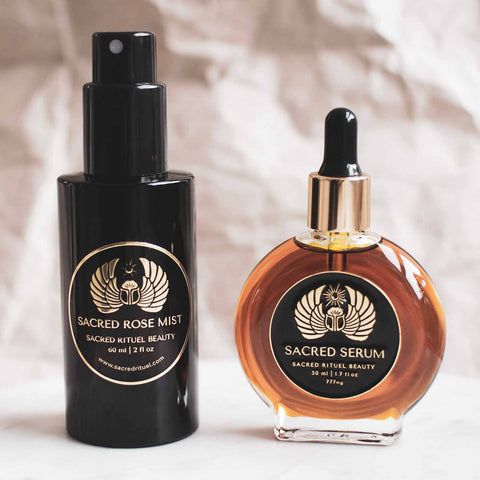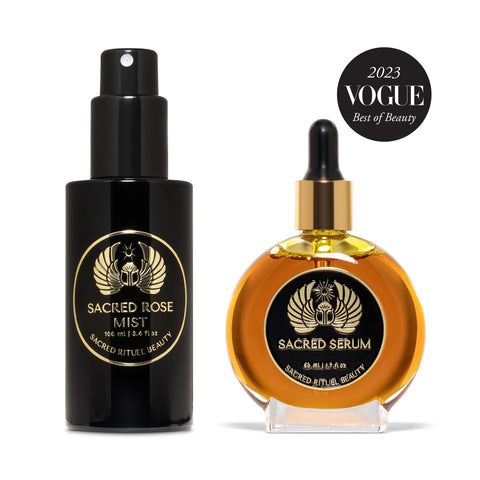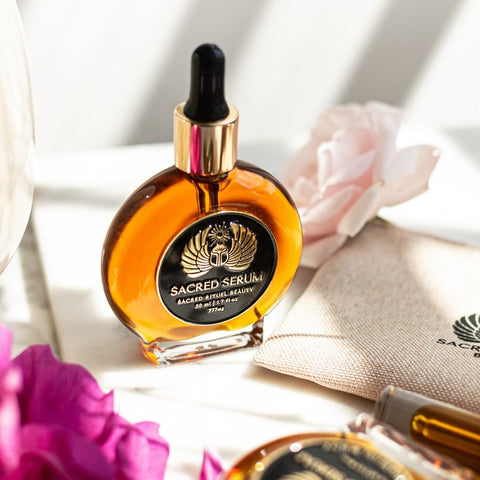Best Products For Hyperpigmentation
As a pioneer in luxurious, organic skincare, Sacred Rituel has set the gold standard for natural beauty solutions. Our dedication to using only the finest 100% organic ingredients has made us a trusted name for those seeking effective, earth-friendly skincare remedies. In this piece, we delve into the best products for tackling hyperpigmentation—a common concern for many. We’ll explore key ingredients, natural remedies, and even spotlight our Sacred Rituel Body Oil, an exceptional choice for those looking to naturally address hyperpigmentation.
Products formulated with Arnica to address reduce skin inflammation, bruising, and swelling.

Key Takeaways:
- Essential Ingredients: Learn which powerful ingredients can effectively combat hyperpigmentation.
- Natural Solutions: Discover how natural oils and remedies can reduce dark spots.
- Professional Insights: Explore expert-recommended treatments for managing stubborn hyperpigmentation.
Understanding Hyperpigmentation: Causes And Types
Hyperpigmentation is a common skin condition where certain areas of the skin become darker due to an overproduction of melanin, the pigment responsible for skin color. Various factors, such as sun exposure, hormonal changes, inflammation, and medications, can trigger this condition. Identifying the type and cause of hyperpigmentation is crucial for selecting the most effective treatment.
Melasma: Hormonal Influence On Skin Pigmentation
Melasma is a type of hyperpigmentation often caused by hormonal changes, especially during pregnancy or from using hormonal therapies like birth control pills. This condition results in dark, irregular patches, primarily on the face. Treatment typically involves sun protection and topical therapies, with some cases requiring procedures like chemical peels or laser treatments.
Sunspots: The Impact Of Prolonged Sun Exposure
Sunspots, also known as solar lentigines, result from prolonged exposure to the sun's ultraviolet (UV) rays. These flat, brown spots usually appear on areas frequently exposed to the sun, such as the face and hands. Although harmless, they are a clear sign of sun damage. Preventative measures, such as regular sunscreen use, are key to managing and preventing sunspots.
Post-Inflammatory Hyperpigmentation (Pih): Skin's Response To Injury
Post-Inflammatory Hyperpigmentation (PIH) develops after the skin heals from an injury or inflammation, such as acne or eczema. This condition results in flat, darkened patches that can take months or even years to fade. Treatments for PIH often include topical agents and procedures like chemical peels to speed up the fading process.
Key Ingredients to Look for in Hyperpigmentation Products
When choosing products to treat hyperpigmentation, it is crucial to focus on ingredients that have been scientifically proven to lighten dark spots and create a more even skin tone. Here are some of the most effective ingredients to look for:
- Vitamin C: Vitamin C is a potent antioxidant known for its ability to brighten the skin and reduce the appearance of dark spots. It works by inhibiting the enzyme tyrosinase, which is involved in the production of melanin, the pigment responsible for skin discoloration. Additionally, Vitamin C helps protect the skin from free radical damage caused by UV exposure, which can worsen hyperpigmentation. Regular use of Vitamin C can result in a more radiant and even complexion, making it a key ingredient in many brightening and anti-aging products.
- Niacinamide: Niacinamide, also known as Vitamin B3, is celebrated for its anti-inflammatory properties and its ability to reduce pigmentation. It works by inhibiting the transfer of melanin to skin cells, which helps to lighten dark spots and prevent new ones from forming. Niacinamide also improves the overall texture of the skin by enhancing its barrier function, leading to better hydration and a smoother surface. This ingredient is well-tolerated by most skin types, making it a versatile option for treating hyperpigmentation while also addressing other skin concerns like redness and irritation.
- Hydroquinone: Hydroquinone is one of the most effective skin-lightening agents available, commonly used in the treatment of hyperpigmentation. It works by decreasing the production of melanin, leading to a gradual lightening of dark spots and patches. Hydroquinone is often recommended for more severe cases of hyperpigmentation, such as melasma or post-inflammatory hyperpigmentation. However, it should be used with caution, as prolonged use can lead to skin irritation or, in rare cases, a condition called ochronosis, which causes blue-black pigmentation. It is often used under the guidance of a dermatologist to ensure safe and effective results.
- Retinoids: Retinoids, derived from Vitamin A, are highly effective in promoting cell turnover, which helps reduce the appearance of hyperpigmentation. By accelerating the shedding of dead skin cells and encouraging the growth of new, healthy cells, retinoids help fade dark spots and improve overall skin tone. They also have the added benefit of reducing the appearance of fine lines and wrinkles, making them a popular choice in anti-aging skincare. Retinoids can be potent and may cause irritation, so they should be introduced gradually into your skincare routine, especially for those with sensitive skin.
- Alpha Hydroxy Acids (AHAs): Alpha Hydroxy Acids (AHAs), such as glycolic acid and lactic acid, are chemical exfoliants that help remove dead skin cells from the surface of the skin. This exfoliation process reveals fresher, more evenly toned skin underneath, which can help reduce the appearance of hyperpigmentation over time. AHAs also stimulate collagen production, which improves skin texture and elasticity. Regular use of AHAs can lead to a brighter, more youthful complexion, but it's important to use sunscreen during the day as these acids can increase skin's sensitivity to the sun.
Natural Remedies And Oils For Hyperpigmentation
Natural remedies and oils offer a gentle, holistic approach to treating hyperpigmentation, making them an appealing option for those looking to avoid harsh chemicals or synthetic ingredients. These natural solutions can be effective in lightening dark spots and evening out skin tone when used consistently. While they may work more slowly than clinical treatments, they are often well-tolerated and can be integrated into a broader skincare routine for a comprehensive approach to managing hyperpigmentation.
Aloe Vera: Soothing And Lightening
Aloe Vera is renowned for its soothing and healing properties, making it a popular choice for treating various skin conditions, including hyperpigmentation. The active compound aloesin, found in Aloe Vera, inhibits the enzyme responsible for melanin production, which can help lighten dark spots over time. Additionally, Aloe Vera's hydrating properties support skin repair and regeneration, making it beneficial for both soothing irritated skin and gradually reducing discoloration. Regular application of Aloe Vera gel can lead to a more even skin tone and a healthier complexion.
Turmeric: Reducing Excess Melanin
Turmeric, a spice widely used in traditional medicine, contains curcumin, a powerful anti-inflammatory and antioxidant compound. Curcumin is effective in reducing excess melanin production, which is often the root cause of hyperpigmentation. By inhibiting the activity of melanocytes, the cells that produce melanin, turmeric can help prevent the formation of new dark spots and gradually lighten existing ones. Turmeric is often used in DIY masks or incorporated into skincare products designed to brighten the skin. Its natural properties make it a gentle and effective option for those seeking to manage hyperpigmentation without harsh chemicals.
Licorice Extract: Fading Dark Spots
Licorice extract is another natural remedy known for its ability to fade dark spots and prevent new ones from forming. The active compound, glabridin, inhibits the enzyme tyrosinase, which is involved in melanin production. By reducing melanin synthesis, licorice extract can help lighten hyperpigmented areas and improve overall skin tone. Additionally, licorice has anti-inflammatory properties that soothe the skin and reduce redness, making it a beneficial ingredient for those with sensitive or irritated skin. Incorporating licorice extract into your skincare routine can lead to a more radiant and even complexion.
Rosehip Oil: Promoting Skin Regeneration
Rosehip oil is rich in essential fatty acids and antioxidants, which are crucial for skin regeneration and repair. The oil's high content of vitamin A and vitamin C helps to brighten the skin and reduce discoloration caused by hyperpigmentation. Rosehip oil also supports collagen production, which can improve skin texture and elasticity while fading dark spots over time. Its lightweight texture makes it suitable for all skin types, and its nourishing properties help maintain a healthy, glowing complexion. Regular use of rosehip oil can contribute to a more even skin tone and reduce the appearance of hyperpigmentation.
Professional Treatments For Hyperpigmentation
For individuals dealing with more persistent or severe cases of hyperpigmentation, professional treatments may be necessary to achieve significant improvement. These treatments are typically more potent than over-the-counter options and can deliver faster, more noticeable results. Administered by dermatologists or trained skincare professionals, these procedures are designed to target deeper layers of the skin, effectively addressing the root causes of hyperpigmentation. It is crucial to undergo these treatments under professional supervision to ensure both safety and optimal outcomes.
Chemical Peels: Exfoliating For Even Skin Tone
Chemical peels are a popular professional treatment for hyperpigmentation that involve applying a chemical solution to the skin. This solution exfoliates the top layers of the skin, promoting the shedding of dead skin cells and revealing fresher, more evenly toned skin underneath. Chemical peels vary in strength, from superficial peels that gently exfoliate to deeper peels that reach the middle layers of the skin for more dramatic results. By removing the outermost layer of skin where excess melanin accumulates, chemical peels can significantly reduce the appearance of dark spots and improve overall skin texture. Depending on the severity of the hyperpigmentation, multiple sessions may be required to achieve the desired results.
Laser Therapy: Precision Treatment For Dark Spots
Laser therapy is a highly effective professional treatment for targeting hyperpigmentation. This method uses focused light energy to break down the excess melanin responsible for dark spots. Different types of lasers are used depending on the depth and type of pigmentation, with some targeting superficial layers of the skin and others penetrating deeper to address more stubborn discoloration. Laser therapy is particularly useful for treating sunspots, melasma, and post-inflammatory hyperpigmentation. While the procedure can provide impressive results, it is essential to have it performed by a qualified professional to minimize the risk of side effects, such as burns or scarring.
Microneedling: Stimulating Collagen For Skin Renewal
Microneedling, also known as collagen induction therapy, is another professional treatment option for hyperpigmentation. This procedure involves using a device with fine needles to create tiny punctures in the skin, which stimulates the body's natural wound-healing process. As the skin heals, it produces more collagen and elastin, which can help improve skin texture and reduce the appearance of dark spots. Microneedling is often combined with topical treatments, such as vitamin C or hyaluronic acid, to enhance the effectiveness of the procedure. Over time, microneedling can lead to a more even skin tone and smoother complexion, making it a valuable option for those with persistent hyperpigmentation.
Prescription Medications: Potent Topical Solutions
For more severe cases of hyperpigmentation, dermatologists may prescribe stronger versions of topical treatments. Prescription-strength hydroquinone, retinoids, or corticosteroids are often used to reduce melanin production and accelerate skin cell turnover. These medications are typically more potent than over-the-counter options, providing faster and more noticeable results. However, because of their strength, they should be used under the guidance of a dermatologist to avoid potential side effects, such as skin irritation or increased sensitivity to sunlight. Prescription medications are often part of a comprehensive treatment plan, which may include in-office procedures and a tailored skincare regimen.
How To Choose The Right Product For Your Skin Type
Choosing the right product to treat hyperpigmentation is crucial for ensuring both effectiveness and skin health. Different skin types require different formulations, and understanding your skin type will help you pick the most suitable options.
Oily Skin: Opt For Lightweight And Non-Comedogenic Formulas
If you have oily skin, it's important to choose products that won’t clog pores. Lightweight, non-comedogenic options like salicylic acid and retinoids are ideal. Salicylic acid helps to exfoliate and clear out pores, while retinoids promote cell turnover to fade dark spots. These ingredients control oil and prevent breakouts, making them well-suited for oily skin.
Dry Skin: Choose Hydrating Ingredients
For dry skin, look for products that hydrate and nourish while treating hyperpigmentation. Ingredients like hyaluronic acid and rosehip oil are excellent choices. Hyaluronic acid provides deep hydration, while rosehip oil helps maintain moisture and promotes skin regeneration. Avoid harsh exfoliants that can worsen dryness.
Sensitive Skin: Go For Gentle, Soothing Solutions
Sensitive skin needs gentle care. Niacinamide is a great option, as it reduces pigmentation and soothes the skin without causing irritation. It’s important to avoid harsh chemicals like hydroquinone or strong retinoids, which can lead to redness and discomfort. Stick to products specifically formulated for sensitive skin to ensure a gentle approach to treating hyperpigmentation.
Sacred Rituel Body Oil: A Natural Solution For Hyperpigmentation
Sacred Rituel Body Oil offers a luxurious and organic approach to addressing hyperpigmentation, making it a standout choice for those seeking natural skincare solutions. This body oil is crafted with a blend of high-quality, plant-based ingredients that work together to nourish the skin, promote regeneration, and even out skin tone. Ideal for those with hyperpigmentation concerns, Sacred Rituel Body Oil combines the benefits of antioxidants, essential oils, and deeply moisturizing components to deliver both therapeutic and aesthetic results.
Nourishing Ingredients For Skin Regeneration
The formulation of Sacred Rituel Body Oil is rich in nourishing ingredients that support the skin's natural regeneration process. Key components like jojoba oil, rosehip oil, and hemp seed oil are known for their ability to deeply moisturize and repair the skin. Jojoba oil, which closely mimics the skin's natural sebum, helps to balance oil production and maintain hydration, preventing dryness and irritation. Rosehip oil is renowned for its high content of essential fatty acids and vitamins A and C, which promote collagen production and help to fade dark spots. Hemp seed oil, rich in omega fatty acids, supports skin elasticity and regeneration, making the skin smoother and more resilient over time.
Antioxidant-Rich Formula For Skin Protection
Sacred Rituel Body Oil is infused with powerful antioxidants that protect the skin from environmental stressors and further damage. These antioxidants help neutralize free radicals, which can cause oxidative stress and exacerbate hyperpigmentation. By incorporating antioxidant-rich oils like rosehip and hemp seed, the formula helps to prevent the formation of new dark spots while aiding in the reduction of existing discoloration. This protective aspect of the oil is crucial for maintaining an even skin tone and preventing future pigmentation issues.
Essential Oils For Therapeutic And Skin Benefits
In addition to its nourishing base oils, Sacred Rituel Body Oil includes a carefully selected blend of essential oils such as sandalwood and lavender. These essential oils offer not only therapeutic aromatherapy benefits but also specific skin-healing properties. Sandalwood oil is known for its anti-inflammatory and skin-brightening effects, making it effective in reducing the appearance of dark spots and hyperpigmentation. Lavender oil, with its calming and healing properties, soothes the skin and promotes an even complexion. The combination of these essential oils creates a synergistic effect that enhances the overall effectiveness of the product, providing both a sensory and skincare experience.
A Luxurious And Organic Choice For Hyperpigmentation
Sacred Rituel Body Oil stands out as a luxurious option for those who prioritize organic and natural skincare. Free from synthetic chemicals and preservatives, this body oil is designed to nourish the skin deeply while being gentle enough for regular use. Its organic formulation ensures that the skin receives only the purest ingredients, making it an excellent choice for individuals with sensitive skin or those looking to avoid harsh chemicals. Regular use of Sacred Rituel Body Oil can lead to a more even skin tone, reduced hyperpigmentation, and an overall healthier complexion.
Read also:
Frequently Asked Questions About Products For Hyperpigmentation
What is the most effective ingredient for treating hyperpigmentation?
The most effective ingredient depends on your skin type, but commonly recommended ones include vitamin C, retinoids, and hydroquinone.
Can hyperpigmentation be treated with over-the-counter products?
Yes, many over-the-counter products contain effective ingredients like niacinamide and alpha hydroxy acids that can reduce hyperpigmentation.
Are there any side effects of using products for hyperpigmentation?
Some products, especially those with strong actives like retinoids, can cause dryness, irritation, or sensitivity, especially in sensitive skin types.
How long does it take to see results from hyperpigmentation treatments?
Results can vary, but typically it takes about 4-12 weeks of consistent use to see noticeable improvements in hyperpigmentation.
Is it safe to use multiple products for hyperpigmentation at once?
It's generally safe to layer products, but it's important to avoid using too many harsh ingredients at once, which can irritate the skin. Consult with a dermatologist for personalized advice.
Can natural oils help with hyperpigmentation?
Yes, oils like rosehip and jojoba oil have properties that can help lighten dark spots and improve overall skin tone.
What lifestyle changes can help reduce hyperpigmentation?
Consistent use of sunscreen, avoiding direct sun exposure, and maintaining a healthy diet rich in antioxidants can help prevent and reduce hyperpigmentation.
Can hyperpigmentation be permanently removed?
While some treatments can significantly reduce the appearance of hyperpigmentation, complete and permanent removal can be challenging, especially for deeper pigmentation.
Are there any specific products for hyperpigmentation that work well for darker skin tones?
Products with ingredients like kojic acid and licorice extract are known to work well across various skin tones, including darker complexions.
Can hyperpigmentation worsen with certain skincare products?
Yes, products that irritate the skin or increase sun sensitivity, like strong acids or improper use of retinoids, can exacerbate hyperpigmentation.
SACRED TRIO | SERUM + ROSE TONER + BODY OIL
Prix régulier$229.00 Prix de solde$257.00SACRED TRIO | SERUM + ROSE TONER + BODY OIL
Prix régulier$229.00 Prix de solde$257.00

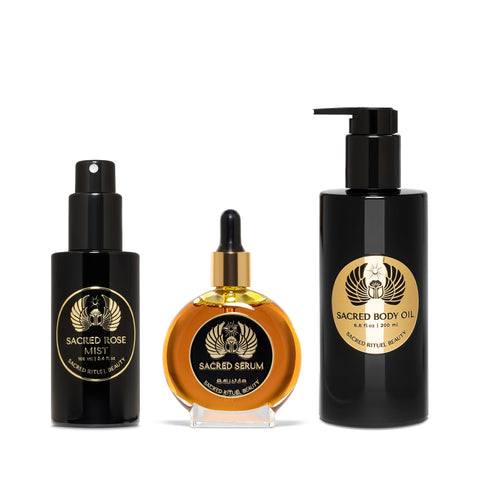


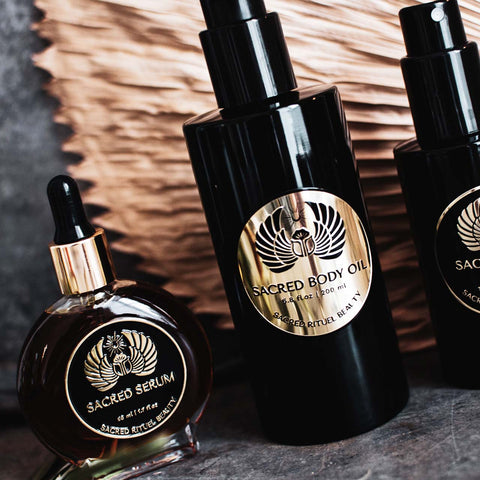
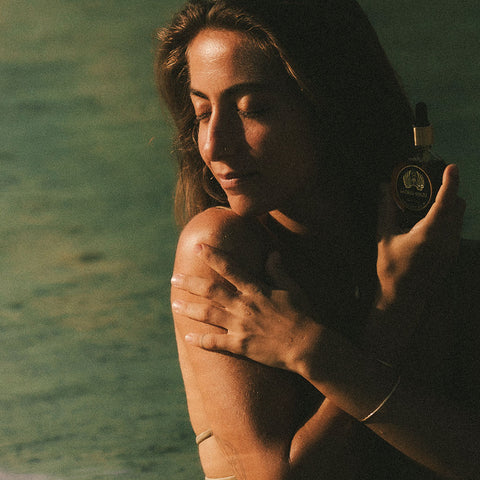
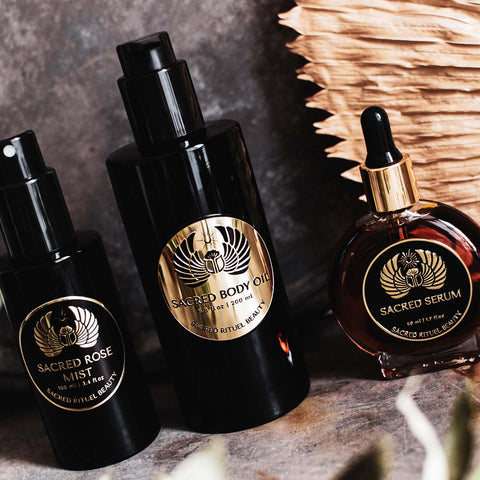
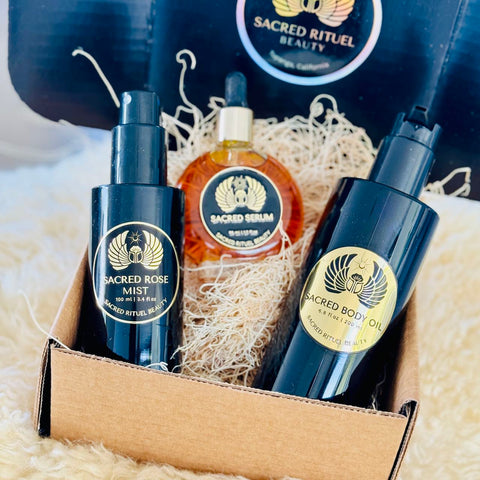
All Day Glow Essentials
Livraison express gratuite sur les commandes de plus de 100 $
Dépensez 100 $ et obtenez la livraison express GRATUITE. Dépensez 50 $ et obtenez la livraison standard GRATUITE. Livraison économique de 5 $ sur toutes les autres commandes.
Détails dans notre politique d'expédition .
Livraison automatique avec abonnement
Assurez-vous d'avoir TOUJOURS un flux constant de SACRED RITUEL à portée de main !
Détails dans notre page d'abonnements .
Retours sans tracas sous 30 jours
Essayez SACRED RITUEL pendant 30 jours et renvoyez-le pour un remboursement complet s'il ne répond pas complètement à vos attentes.
Détails dans notre politique de retour .
RITUEL SACRÉ est
Soins de la peau bio à haute puissance
Bulletin
Restez connecté sur les conseils de bien-être, les ventes exclusives et les événements !

